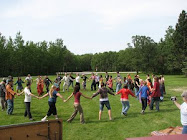© 2010 Karen Van Fossan
True Confession Number One:
My father appears to have turned Republican.
True Confession Number Two:
In 2004, my brother argued that John McCain might make a good president.
Final True Confession:
I feel hurt and angered by many of the platforms and practices of today's Republican party.
Should our family shy away from discussing politics? If that's the only way to prevent heartburn at holiday meals – certainly. But what if we could discuss such things authentically? What if our communities could do the same?
To answer this question in my own life, I am inspired by the practice of Authentic Movement, as put forth by Mary Starks Whitehouse, Janet Adler, and Joan Chodorow. In the practice of Authentic Movement, we have three distinct phases.
First, there is a Mover and a Witness. The Mover essentially moves, in any way she or he sees fit. The Witness simply witnesses, sees, offers a presence. Second, the Mover and Witness switch. Witness becomes Mover; Mover becomes Witness. And finally, they speak about their experiences – and only their own experiences.
This third part is the part I'd like to emphasize. Let's say my Authentic Movement partner had raised her arm during her movement time. If I wanted to speak about this experience – I would not say, “Why do you always raise your arm?” or “Arm raisers are evil,” or “Isn't that like a Republican/Democrat/liberal/right-winger?”
I might say, “When I saw you raise your arm, I felt afraid,” or “When I saw you raise your arm, I worried that something bad was going to happen,” or “When I saw you raise your arm, I got angry enough that I wanted to raise mine.”
So, when my friend Don expresses his personal joy that Barack Obama was elected – even though I was never a big Barack Obama enthusiast, I can honor Don's celebration. Or at least I can be willing to hear it – because Don is speaking for himself. We do not steal each other's voices by speaking with our own.
I'd like to see our community overflowing with full, diverse voices – where we do not mute ourselves, but take responsibility for our speech. It's not that we must silence ourselves on the controversial issues of our time, but that we can speak authentically when we speak.
Fifty million years ago – or so – I attended a workshop on conflict resolution through the Conflict Resolution Center at UND. At the time, I was surprised to learn that compromise is not the preferred method of managing conflicts. In a compromise, we look at our opposing goals. I give up a little something, you give up a little something, we attempt to meet in the middle, and possibly neither of us is satisfied.
In the conflict resolution approach, we look at deeper needs, and find ways we might be able to meet those needs expansively, through consensus. It could be, in the end, you get all that you wanted, or I get all that I wanted, or we change what we wanted. But the conflict is resolved if we've managed to meet the needs that brought us to the conflict.
For instance, it used to be that I wanted something that my partner didn't want. My goal was to move to the east and join an intentional community. Kris's desire was to stay here in Bismarck. Had we simply compromised, we might have chosen a spot in the geographic middle of these places – somewhere like Detroit.
What did I need? Community. What did Kris need? Community.
It has taken us years to manage this conflict, but we are able to do so, as long as we look at what is needed, rather than what goal – or position – can be bartered or achieved. It's not that we both deserve a certain outcome to this argument. What's important is that our needs are valued in the relationship. I believe the same is true in families and even this community.
The question I hope we can ask ourselves is, “What is needed in this community of ours?” When we take responsibility to speak from our own experience and voice our authenticity, we help create a culture where authenticity is nurtured – and we are all more likely to get what we need.
So – some examples of authentic speech.
Instead of saying, “That's stupider than stupid!” – we might say, “I didn't like that.”
Instead of saying, “This is the most boring blog I ever read in my life!” – we might say, “I wanted to feel inspired, but I didn't.”
Instead of saying, “George Bush is an evil, low-life scum bag!” – we might say, “I am outraged at the former president, and I would like to see him held accountable.”
Instead of saying, “Did you see those Mexicans? They should be sent home!” – we might say, “When I see footage of immigrants at the border, I feel scared there won't be enough resources to go around.”
If we can do this, if we can further invite authenticity into our speech, our expression, our means of resolving conflicts – we aren't just welcoming discussion at family dinners, we are more fully welcoming ourselves.
Wednesday, April 28, 2010
Subscribe to:
Comments (Atom)





























